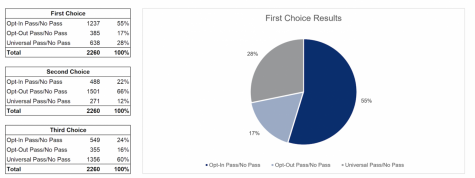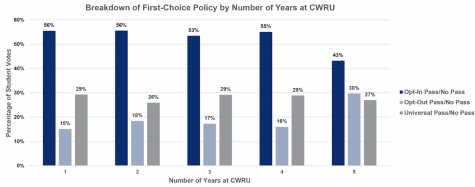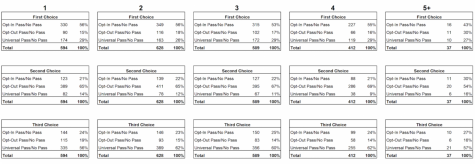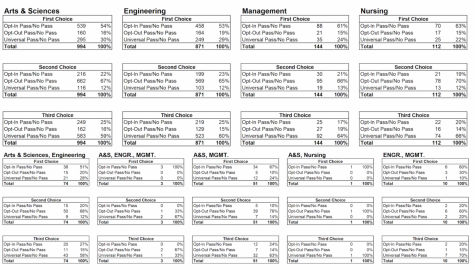LTTE: Universal Pass/No Credit is not inclusive
The Faculty Senate must keep the Opt-In Pass/No Pass Credit grading policy
April 14, 2020
The fact that Universal Pass/No Credit attempts to address off-campus disparity is a noble idea. However, such a policy does not account for the diversity in opinion of the greater student body and is, therefore, intrinsically exclusive. By comparison, an Opt-In Pass/No Pass policy empowers students with the ability to decide for themselves what grade─be it letter or passing─they wish to pursue. Below, we have outlined the argument in support of Opt-In Pass/No Pass grading policy, supported by student testimonials.
Students requiring high grades for graduate school and/or career advancement.
Regardless of other factors (interviews, entrance exam scores, etc.), GPA is a highly important element for determining future educational and professional careers. CWRU students are often competitive candidates for the best graduate programs and jobs, across all disciplines. This is particularly critical for upper-class students, who are within a year of having to make career-defining decisions.
For many, Opt-In Pass/No Pass provides the opportunity to bolster GPA while still allowing students the ability to secure letter grades.
While the argument can be made that some companies will be lenient towards Universal Pass/No Credit grades, others will surely not. It should be left to individual students who are empowered with the knowledge of their own field to make a decision that would serve the best interest of their career plans, rather than a broad unilateral decision that Universal Pass/No Credit would entail.
Lack of evidence of Universal requirement among graduate schools
A primary argument in favor of Universal Pass/No Credit is that several medical schools (for example, Harvard Medical School, Oregon Health and Science University, Baylor College of Medicine, etc.) have stated that only Universal Pass/No Credit grades will be accepted for credit. However, as the COVID-19 situation progressed, they shifted their stance. Now, these medical schools have stated that any Pass/No Pass grades will be accepted.
As of now, the percentage of medical schools that have taken a contrarian stance on optional Pass/No Pass is extremely low. It would be rather premature to mandate a Universal Pass/No Credit policy purely on the speculation that more will adopt a mandatory Pass/No Pass requirement. At this moment, a vast majority of graduate schools in all disciplines have done little more than announce that they will accept Pass/No Pass grades. Meaning, at this point, it is in the interest of students to allow them to decide for themselves how much their grades for this semester should factor into their overall GPA, in regards to candidacy for these schools.
Timing of grade changes
As of April 10, there are only seventeen days from the last day of classes. Should a Universal Pass/No Credit policy be adopted, students who have strived to achieve their best possible results during this semester─students under the impression that letter grades would be maintained─could lose the fruits of their labor less than three weeks before classes are concluded.
Accounting for students disadvantaged by off-campus conditions
The principal argument for Universal Pass/No Credit is that such a system would account for students that are otherwise disadvantaged due to off-campus conditions (poor internet, lack of study space, etc.). Consideration for these individuals is a just cause, which we fully support. However, consideration does simultaneously have to be given to the larger percentage of students who would be affected by the extreme change that Universal would bring.
With this idea in mind, and acknowledging the fact that students disadvantaged by off-campus conditions all have a unique set of both hardships and classes, it is better to more specifically address their individual concerns on a case-by-case basis rather than subjecting all CWRU students to a Universal policy that 72% of undergraduate students do not want.
Therefore, in the spirit of inclusion, it should be the role of the Undergraduate Diversity Collaborative (UDC) and the Diversity and Inclusion Committee (D&I) of the Undergraduate Student Government (USG) under an Opt-In Pass/No Pass System to facilitate a dialogue between disadvantaged students who still wish to receive a letter grade (for purposes of graduate school, GPA, etc.) and their professors to reach solutions catered to alleviating each student’s stress while guaranteeing the equal opportunity for classroom success.
In the event of professors not being attentive to or altogether disregarding a student’s concerns, it would then be UDC and D&I’s responsibility to address that issue as student advocates.
Such an initiative would serve to best address the particular circumstances afflicting disadvantaged students who still wish to be academically competitive, while also mitigating abuse of a Universal Pass/No Credit grading policy that some students would undoubtedly seek to exploit.
Statistical Analysis
Beginning on April 6 and operating until April 10, UDC and USG conducted a survey of CWRU undergraduate students in order to best understand student concerns and opinions regarding what form of Pass/No Pass grading CWRU should adopt. This survey requested several pieces of data from students, including their year at CWRU, student college(s) and student rankings of the three choices (Opt-In, Opt-Out, or Universal Pass/No Credit). At the time of this document’s writing (around 7:00 PM EST on April 10), 2,260 CWRU undergraduate students (approximately 43% of CWRU’s total undergraduate population) had responded to this poll. The results are broken down as follows:
Per general results, a clear majority exists among the three choice selections. For first choice selection, the current Opt-In plan is the strong majority. For second choice selection, the alternative Opt-Out plan is the overwhelming majority, likely due to being viewed as a compromise between Opt-In and Universal. And for the third choice selection, the Universal Pass/No Credit plan was the majority. Evidently, among the student body as a whole, retaining the current Opt-In policy is the majority choice. We then proceeded to further break down these results in terms of both number of years at CWRU and student college(s):
Results by number of years at CWRU:
In looking at the results by number of years at CWRU, a nearly identical trend to the general results is evident. Apart from students who have been at CWRU for 5 or more years (who accounted for only 1.6% of total respondents), very similar selection percentages for first choice were reflected. For all 5 year options, the current Opt-In policy remained the preferred option. In all cases apart from 5+ years, this also accounted for a simple majority of student respondents. Similar to the general results, when considering the second and third choices, the results were once again Opt-Out and Universal, respectively. Evidently, there is no statistically significant difference in voting results that has arisen from the students’ number of years at CWRU.
Results by student college(s):
Similar to the results by year, the results by specific student college(s) displayed a very similar trend to the general results. Among the nine different college responses, all of them responded with the current Opt-In policy as the first choice. Apart from three individuals who are students of all three of the Arts & Sciences, Engineering and Management schools, all major selections also displayed the general trend of Opt-Out as the second choice and Universal as the third choice. In looking at the first choice results, students enrolled in the Management or Nursing schools, or those in multiple colleges, responded with a higher percentage (61% and 63%, respectively) towards the Opt-In than those in the Arts & Sciences and Engineering schools (54% and 53%, respectively). Despite this, though, all nine selections still resulted in a simple majority towards Opt-In. Evidently, like with breakdown by years, there exists no statistically significant difference among the results by the specific college(s) that the respondents attend at CWRU.
Student Testimonials:
“I find it really unfair that members of USG and UDC are making me feel guilty of wanting my grades during this time. As a low income student myself, it seems as if they are speaking on my behalf without consensus. My mom has had to take on more hours and days at her job to help support my family and I am aware that even though my situation is difficult and I am often unable to study, that I came to college to do my best to achieve despite adversity and THAT is the best way I will be able to support my family. My past three years year have not been the best as I have suffered from mental and physical health problems throughout, but this semester was going to be great for me as it is the first semester where I am still able to get paid for my two time consuming on-campus jobs and use the time I would have working there to study for my classes. I am disgusted by the use of my fellow students’ responses to push for something that does not fully represent the needs of me and my fellow students.”
“I believe that at this point in the semester, it is hard to take away from students who have been able to achieve grades that they deem to be either positive or ideal. There are most likely students who are unable to put their full effort into their classes while at home due to the pandemic, and I believe their ability to do pass/no pass option should be extended until after they know their grades. However, I find it unnecessary to bring down students who have been able to achieve throughout this semester in order to bring up students who have not been able to do so, especially if students are looking at applying to graduate school. I think the biggest question that needs to be answered is how will graduate school application reviewers view someone who chooses to pass/no pass vs someone who would have positive grades for this specific semester? I personally think pass/no pass for this semester shouldn’t be viewed with the same connotation that it does normally, but if a student thinks that their chances of getting in will be helped by having actually grades from this semester, that student should be able to opt for grades.”
“P/NP should be extended to past final grades- it is not fair that most students will be having their first round of remote exams during finals and do not know what the circumstances will be like. Also, Universal Pass/No Pass does not re-establish equity within the system UNLESS all colleges/universities adopt it. By having it as the only option, you take away freedom of choice, and therefore there will always be one group that is disadvantaged.”
“I completely support giving students the option to Opt-In for Pass/No Pass considering the circumstances. However, it is neither reasonable nor fair to FORCE students to not get letter grades. No one anticipated these scary times that we’re experiencing, and no student should be penalized because of it. This includes students who have semester grades that they’ve worked hard for and are proud of. I am planning on going to graduate school after I graduate. I deserve the hard work I’ve put into this semester to be reflected in my GPA, which will definitely help me when I’m applying to grad schools. Once again, I think that keeping the Opt-In Pass/No Pass is completely fair, as it helps students who don’t have the academic and environmental resources needed to succeed at school. Keeping that policy only helps, it doesn’t hurt anyone. Requiring all students to switch to Pass/No Pass, however, DOES HURT a group of students. This is why I support leaving the policy as is (Opt-In), but will be extremely disappointed if it changes to a mandatory Pass/No Pass.”
“Universal P/NP is bad for those going to graduate school because we’ll be compared against people from other schools who are not P/NP. I definitely empathize with the struggles students are facing because of this pandemic. My dad is about to lose his job. I don’t have a desk to do work at. I constantly argue with my parents about food and protective equipment. My wifi goes out during classes/meetings/while doing homework. I have extra responsibilities at home. But I had half a semester of normal schoolwork that helped me set myself up for success (which I don’t want discounted by P/NP) and understanding professors who are working with us to make sure we can learn in our environment. Some professors are better than others at this, but that’s not cause for universal P/NP. I think removing autonomy of students in this case is a bad idea, but opt out showing university support for P/NP is totally cool by me.”
“Certain members of USG have announced extreme vocal support for a universal P/NP policy. I always believed that USG was here to advocate for the students, and keep the best interests of students in mind. Further, members of the Diversity and Inclusion committee are advocating for the universal policy. It doesn’t seem very inclusive to me that they are excluding a large majority of the population that would prefer an optional P/NP system, and USG is not advocating for students if they are not supporting students who may want/need their grades for their internships, jobs or grad school applications and candidacy. F****** hypocrites.”






